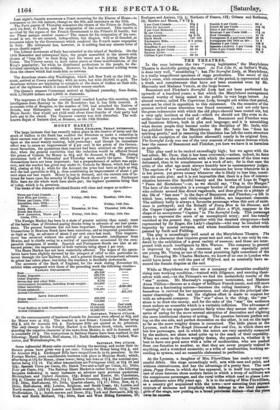While at Marylebone we thus see a company of obscurities
creditably rising into working condition,—trained with diligence, and exerting them- selves with zeal,—at the Princess's we find the melancholy results of the " star " system. Mr. Macready's engagement terminates, and Madame Anna Thillon—famous as a singer of brilliant French music, and still more famous as a fascinating actress—becomes the ruling luminary. The Am- bassadress is revived for her appearance, and she plays the principal cha- racter charmingly. But not the slightest effort is made to support her with an adequate company. The " star" alone is the thing; the " star " alone is to draw the money, and for the sake of the " star " the audience must endure an ensemble which is a veritable infliction. The advocates of " starring" do not argue the question fairly when they accuse their adver- saries of caring for the more sensual attraction of decoration and slighting the more intellectual charms of acting. The question between perfect eat- ing on the one side, and perfect decoration on the other, is not on the tapis as far as the more weighty drama is concerned. The little pieces at the Lyceum, such as The Rough Diamond or Box and Cox, in which there are but few personages, and in which the actors are very carefully measured by the authors, are alone acted quite up to the mark of their capability. When we come to the more weighty drama, the question is, whether it is best to have one good actor with a tribe of mediocrities, who are pushed from one function to another, so that they are never properly trained in anything, and a wretched ensemble; or a tribe of mediocrities, working ac- cording to system, and an ensemble elaborated to perfection.


































 Previous page
Previous page